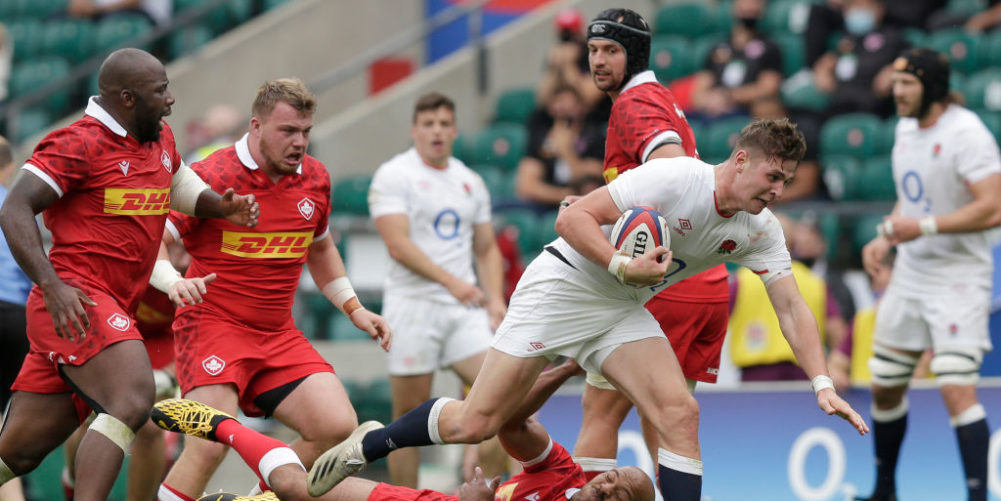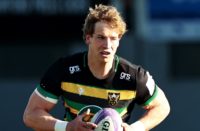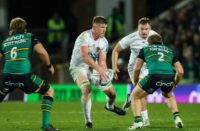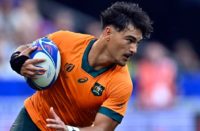Canada lost to England and Wales this month by the same margin, 56 points, but their head coach Kingsley Jones pointed out one notable difference between their two opponents.
“The ball-in-play time was far higher in Cardiff than it was at Twickenham,” he said. “We struggled to cope with England's physicality in the set-pieces and in the mauls. They split our second rows and we were unable to deal with them as we would have liked.”
England's head coach Eddie Jones awarded 16 new caps this month, looking for at least four players to retain their places for the November international series, but it was business as usual in terms of approach, never mind the presence of two opportunists a halfback, Harry Randall and Marcus Smith .
With Ollie Lawrence unavailable against Canada, Jones compensated for the loss of his main ball carrier behind by using the prop Ellis Genge to stand outside Smith and make dents in the defence. The loosehead went further and regularly burst through it, putting his side on the front foot and generating quick possession.
The presence of Harry Wells in the second row meant the maul was more cohesive than it had been the week before against the United States. Jamie Blamire scored a hat-trick of tries on a weekend when hookers indulged themselves: Dane Coles and Ronan Kelleher scored four for New Zealand and Ireland respectively while Jamie George crossed twice for the Lions against the Sharks.
Jones has said from his first day at Twickenham that he would build the side around the traditional staples of English rugby: the set-pieces, the maul and defence. He is not deviating from that, and while half the ten tries against Canada were scored by the wings, Joe Cokanasiga and Adam Radwan, who marked his debut with a hat-trick, his side played with calculation.
Randall and Smith did not move the ball for the sake of it, only when they scented space. Slow ball was kicked downfield and, where Canada were overrun by Wales, who were more prone to taking risks, they were worn down by England and their scrum was eviscerated.
Four days after the victory over Canada, England secured the Grand Slam in the U20 Six Nations with a bonus point victory over Italy at the Arms Park. They were 17-0 up at halftime, but as their foundations crumbled, undone up front where Italy's tighthead prop Ion Necauli – whose neck appeared as wide as his shoulders – stood out for his all-round performance, as strong over the ball as he was scrummaging, and they blew three attacking lineouts.
As their lead melted into one of five points, it took the prompting of the replacement outside-half, Fin Smith, to restore their equilibrium by playing for position and letting Italy's indiscipline take care of the result. It was a victory fashioned not on the precepts Jones places a premium on, but the finishing of the Exeter wing Arthur Relton and not panicking when Italy started to take a grip.
What was notable about Marcus Smith's first two Tests for England was that he did not play as if he had his Harlequins club jersey on. He immediately adapted to the very different way England have of playing, in part necessitated by the more rarified atmosphere international players operate in, and when he joined up with the Lions last week, Warren Gatland noted that the outside-half was like a sponge when it came to absorbing information, desperate to learn so he could fit in. For all his talent, Smith is no maverick.
It suggests Smith will be one of the players auditioned this month who gets the part. “These players are learning their craft and the big thing is desire,” said Jones. “They have to want to keep getting better. They all have talent and they have all been a delight to work with. All that can stop them is a lack of desire and hard work. What we have done this month is create a bit more competition. We have 59 players competing for 31 places in the World Cup squad. Everything they do from now on will be the test of them.
“The half-backs showed they have the game to play Test rugby. If they work on the areas they need to improve, they will have a good career and that goes for a few others as well. Marcus has a good feel for the game and sees space. He still has a way to go, but he is 23 and Dan Carter was at his best when he was 35. The Lions will be a great learning opportunity for him and speed up his development a bit.”
Jones' preference at 10 in big matches in recent years has been Owen Farrell rather than George Ford. The England captain will be 30 in September and while he would be hardly past it, and his opposite number for South Africa A on Wednesday, Morne Steyn, is seven years his senior, the way World Rugby is trying to shape the game to reduce the number of collisions, and with it the concussion rate, reactive players will probably become of greater value than supreme executors of a gameplan.
Jones was on a World Rugby working group which looked at the breakdown and knows what is coming, an increase in the average ball-in-play time in Test matches. A number of law trials will be introduced globally from the start of next season to, in the words of one headline last week, “save rugby from oblivion”.
Save it from itself, more like. The match between South Africa A and the Lions was brutally raw, unremittingly physical and, surely, unsustainable. Two of the law trials are designed to coax teams into seeking space rather than contact, although in the past changes designed to have that effect, such as defending backs having to stand five metres behind a scrum, have been sabotaged by coaches.
ENGLAND'S NEW LOOK, POSITION BY POSITION
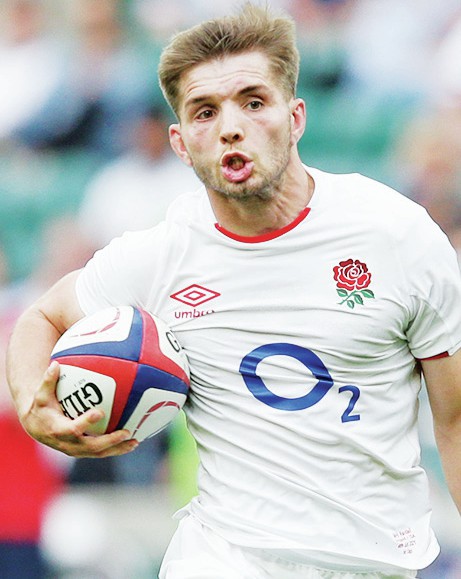
OUTSIDE-HALF
The decision for Jones is when to start Marcus Smith against top opposition. The head coach has tended to be someone who needs to be convinced before making a paradigm shift, but the law trials may give him a nudge. Where will Farrell, his captain, fit in? Jacob Umaga did not get any time at 10 and faces a big season at Wasps. The U20s Fin Smith should feature regularly for Worcester while at Bath Orlando Bailey has Danny Cipriani for competition at 10 and may find himself at full-back.
SCRUM-HALF
Eddie Jones is usually unresponsive when asked to talk about individual players after a match against an emerging nation, so when he spoke at length about Marcus Smith and Harry Randall it was a sign they had both passed their auditions. Jones is facing the same decision with Ben Youngs that he had with Care four years ago: will he make the World Cup? Randall has given him an option, while the U20s Jack van Poortvliet, below, and Raffi Quirke will be monitored and the likes of Dan Robson and Ben Spencer will keep knocking.
WING
lt is not a problem position for England with Anthony Watson and Jonny May between them scoring six of their 12 tries in the Six Nations, but Joe Cokanasiga made a rampaging return after a two-year absence, Adam Radwan scored a hat-trick on debut, possessing the pace to make the smallest gap like the width of the pitch, and while Max Malins lasted only nine minutes in the opening match, he is very much part of the future. Arthur Relton's pace was too much for Italy and he will be looking for an opening at Exeter after the departure of Alex Cuthbert.
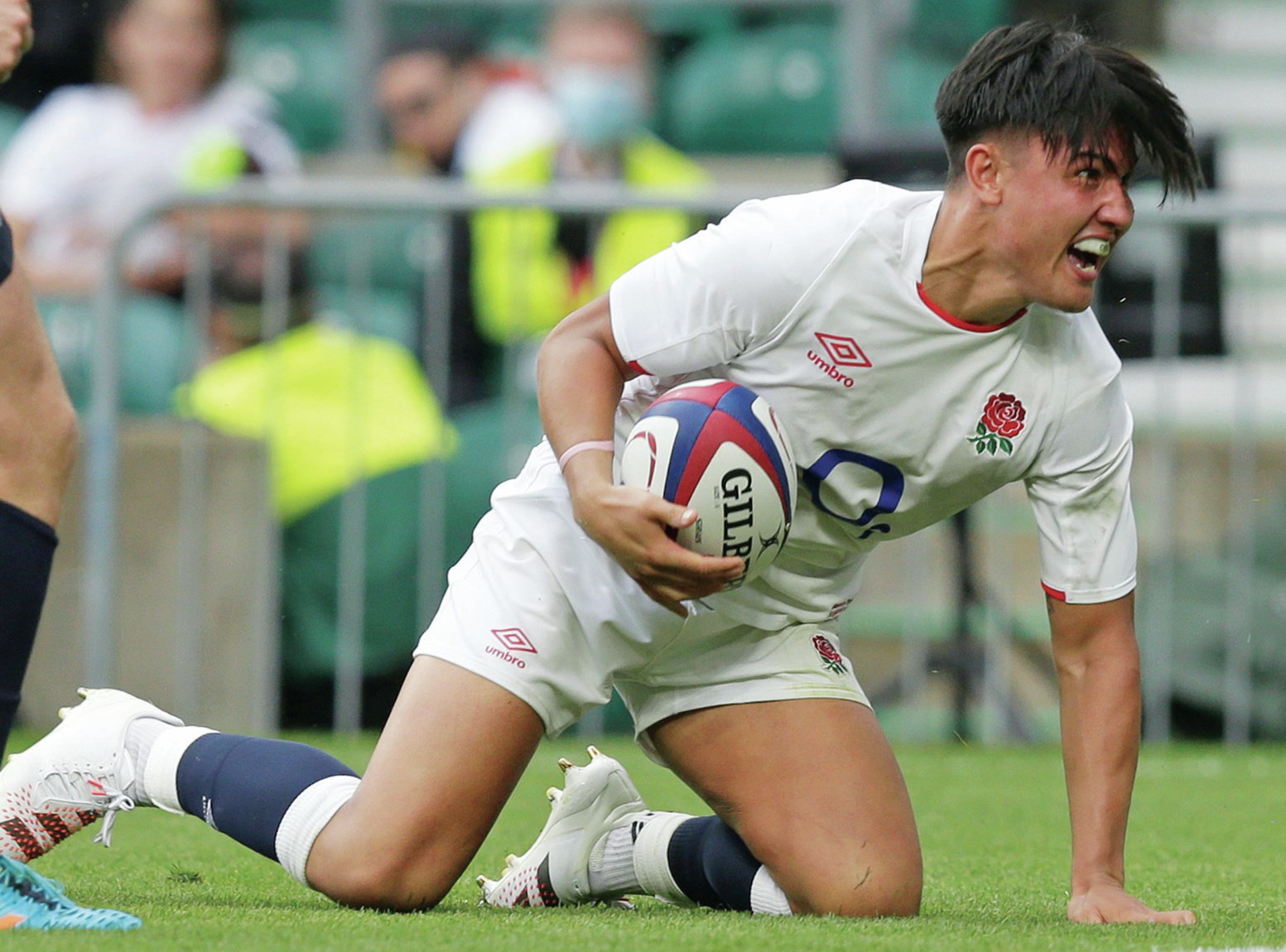
FULL-BACK
Freddie Steward excelled in defence and attack against the USA and Canada in a position that may have a vacancy with Elliot Daly taking his op- portunity at outside centre with the Lions. He was chosen ahead of George Furbank, who started last year's Six Nations, with the Northampton back Corn¬ing on against Canada at outside-half in place of Smith. Orlando Bailey scored three tres in four Starts in the U20 Six Nations, a player Bath describe as one of the most competitive and self-driven they have had in their academy.
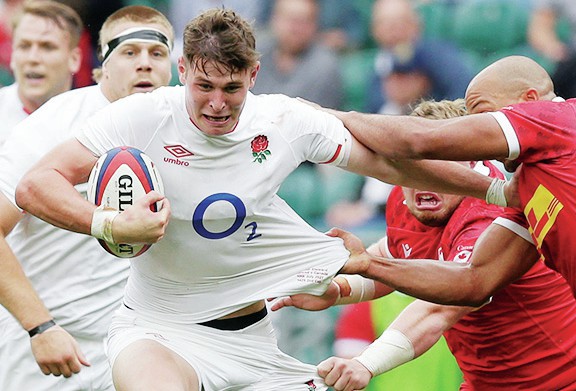
CENTRE
Eddie Jones likes a gainline breaker at inside centre but with Manu Tuilagi regularly injured, he has not often had one. Ollie Lawrence was injured before half-time against the USA and his departure coincided with England's performance dipping. Dan Kelly started against Canada, not a 12 blessed with brüte force, while Dan Lancaster, the son of the former England head coach Stuart, occupied the position for the U20s, a second-five rather than a bludgeon. Henry Slade had a quiet series at outside centre, as if acclimatising to the changes around him, while Joe Marchant had 20 minutes as a wing replacement.
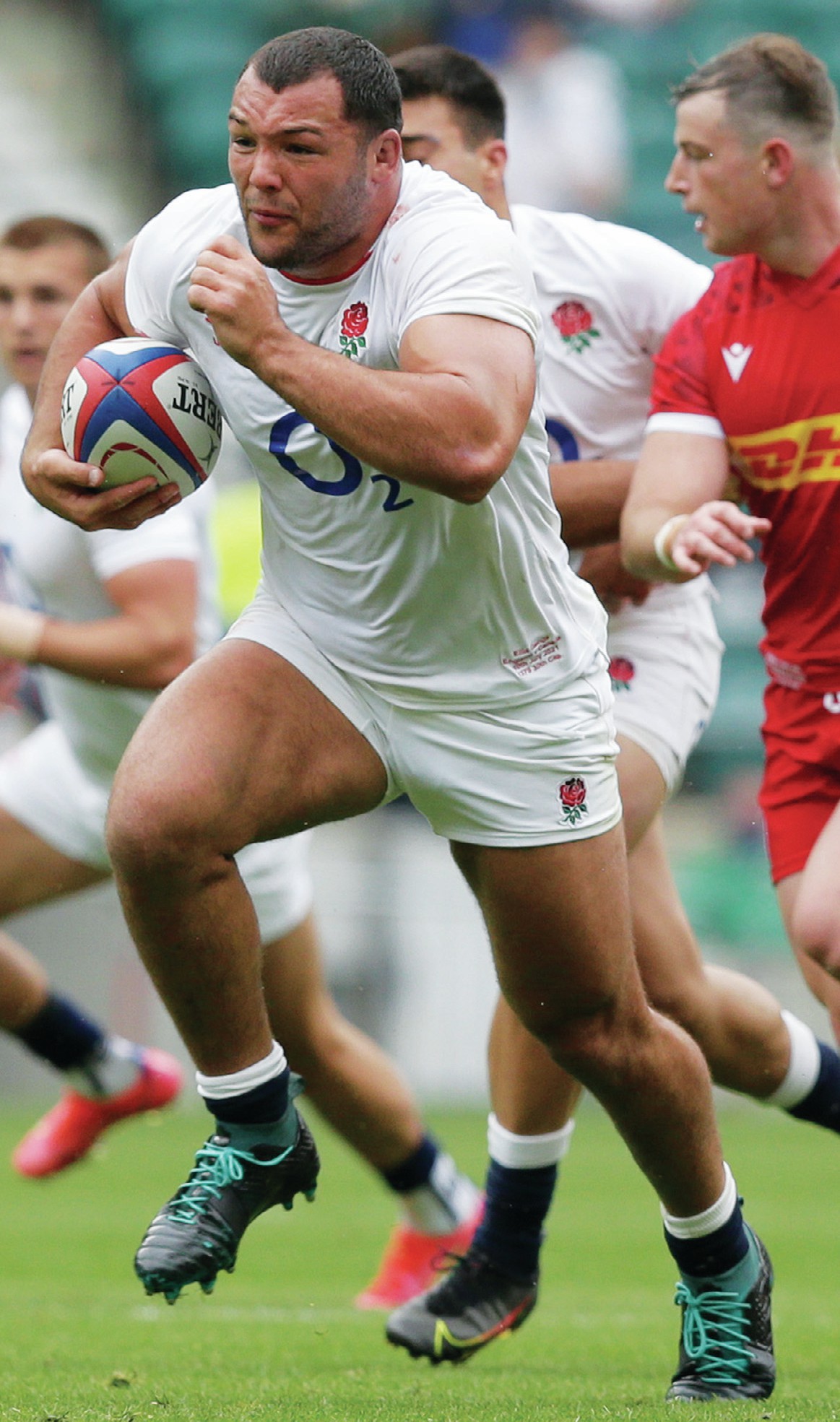
FRONT ROW
Ellis Genge made a big impression, thriving on responsibility and looking like a leading international front rower: had he shown that resolve in the Six Nations, he would probably now be in South Africa. Joe Heyes on the tighthead was strong in the set-pieces and at hooker Jamie Blamire, left, made an impact, and not just because he scored three tries against Canada: like Marcus Smith, he embraced the international game. Sam Riley, built like Blamire, scored five tries for England U20s and the hooker has been linked with a move from Harlequins, who have signed Jack Walker from Bath, to Exeter.
SECOND ROW
The one position that will have left Jones wishing for more. Harry Wells made a difference against Canada in the maul, one reason Blamire got over the line so often, but he is a hard-working grafter who tackles and frustrates opponents by putting himself about rather than a carrier, although two seasons ago he started nine matches at blindside flanker for Leicester. Bristol's 6ft 8ins South African Alex Groves started all five matches for the U20s but has yet to make his senior debut for the Bears.
BACK ROW
Sam Underhill's exclusion by the Lions looked all the more surprising after his two performances and the way the tourists struggled over the ball against South Africa A. Lewis Ludlam made an impact from the bench while at No.8 Alex Dombrandt was more a Nathan Hughes than a Billy Vunipola, preferring to stand wider and attack space. Jack Clement, left, played at 7 and 8 for the U20s and the Gloucester back rower resembles Vunipola, hard to stop when he gets into a gallop.
The first will see an attacking team awarded a lineout if they kick the ball into touch on the bounce from their own half. The aim is to force defending teams to drop players back to prevent the ball from going out, but will any holes be in the defensive line or behind it?
The second is more radical. Most multiple phases of forwards chargmatches now have periods when both sides launch pick-and-gos as they lay siege to the opposition line. If they get over it but fail to ground the ball, they are awarded a scrum. From August 1, the defending team will be awarded a drop-out from under their posts. Instead of ing into defenders, World Rugby hopes the ball will be moved wide after a couple of failures to score from close range.
If the changes have the impact their creators desire, it will have a seminal impact on the role of the half-backs.
Jones has been consistent at 9 and 10 in his five and a half years in charge of England: Farrell or Ford, with Danny Cipriani thrown one bone that had no meat on it, at outside-half; Ben Youngs at scrum-half, backed up initially by Danny Care but under no real threat for the last three years.
There are few Premiership clubs who do not have a scrum-half who has been capped by Jones: Care at Harlequins, Exeter's Jack Maunder, Randall at Bristol, Northampton's Alex Mitchell, Ben Spencer of Bath who was on the bench for the 2019 World Cup final, Leicester's Youngs, Will Heinz, who is joining Worcester from Gloucester and Dan Robson at Wasps.
When Jones took over England, he had few options at openside flanker: now he is overrun with them and from a position where he did not see an alternative to Youngs, Randall has emerged, the England U20 captain Jack van Poortvliet was named man of the U20
Six Nations after leading England in five bonus-point victories and the 19-year-old Sale 9, Raffi Quirke, is understudying South Africa's Faf Klerk and, like Randall, senses opportunity.
At outside-half, Jacob Umaga is like Smith in wasting no time in getting quick ball wide and Wasps have another young player at 10, Charlie Atkinson, who was part of the England U20 squade this summer, along with Bath's Orlando Bailey, who was used at full-back, and another Smith, Worcester's Fin.
All four players are moulded differently to Farrell, and indeed his rival for the Lions' outside-half jersey, Dan Biggar. Is it a sign of the way the game is changing or will Test rugby reduce them to conformity? The U20s differed from the senior side in the ways they won matches: they were 19-3 down at half-time against France but won the second period 35-3 and they overpowered Ireland in the third round in a match between the only two remaining unbeaten teams in the tournament.
And on the final day they squirmed out of Italy's grasp in a way the senior side was unable to when Wales came back at them in Cardiff in this year's Six Nations.
“All five opponents posed different challenges,” said the U20 coach, Alan Dickens. “We were a touch tired in the second half against Italy and they made us earn the win. What the players showed again was that they wanted to play rugby and I have seen that throughout the season.”
As the midway point between World Cups nears, Jones is looking for England to play rugby after a disappointing Six Nations when some of the problems they faced were beyond his fixing. With Premiership clubs reducing the salary cap to repair finances that, already weak, were further damaged by the pandemic, there should be more opportunities than in the past for players graduating to the senior game.
Critics of England in the southern hemisphere used to say their motto should be who dares sins. Jones' team may not become as obsessed about ballin-play time as much as Wales, but there is likely to be a greater emphasis on creativity rather than waiting for a mistake: relish to accompany the roast beef.

